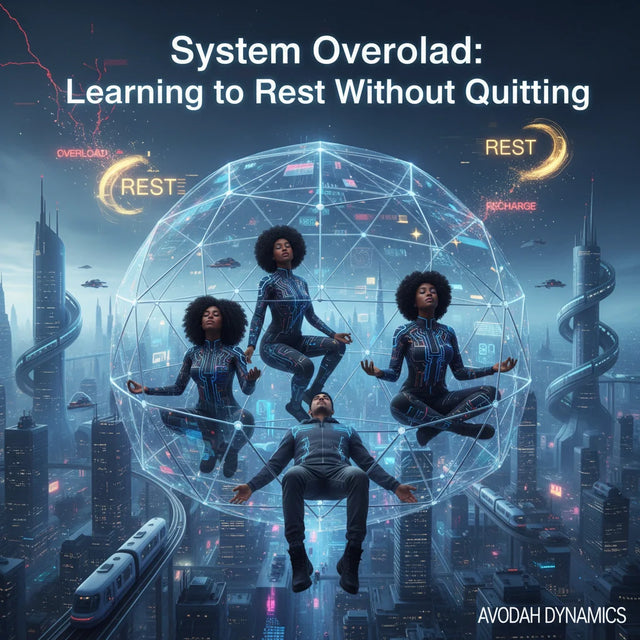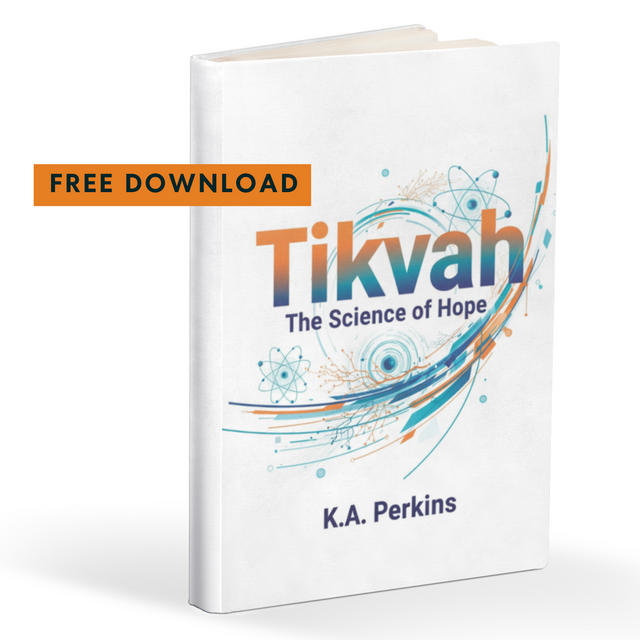Sabbath Mindset Unlocks Your God-Given Purpose When Life Overheats
Your laptop starts slowing down. Programs freeze mid-task. The fan kicks into overdrive, whirring desperately as the processor overheats. Sound familiar? We've all experienced the frustration of a system crash, when too many programs running simultaneously bring everything to a grinding halt.
But here's what's wild: we experience this same phenomenon in our spiritual and emotional lives, yet we keep pushing through like broken machines, convinced that rest equals failure.
What if I told you that your burnout isn't a character flaw, it's a system alert? And just like that overloaded computer, you don't need to throw yourself in the trash. You need a strategic reboot.
When Your Soul Needs a Hard Reset
In our hustle-obsessed culture, we've been programmed to believe that stopping means quitting. But God designed a different operating system, one that includes regular maintenance cycles, intentional shutdowns, and restoration protocols.
Think about it: even the most powerful computers require downtime for updates, virus scans, and system optimization. Yet somehow, we expect our hearts, minds, and spirits to run 24/7 without consequences.
The truth is, rest isn't rebellion against your purpose, it's the very thing that keeps your purpose running smoothly.

The Divine Precedent for Downtime
Before we dive deeper, let's establish something crucial: rest has divine backing. In Mark 1:35, we see Jesus, the Son of God, with the weight of humanity's salvation on His shoulders, making a radical choice: "Very early in the morning, while it was still dark, Jesus got up, left the house and went off to a solitary place, where he prayed."
Read that again. Jesus, who had healing to do, disciples to teach, and a mission to complete, prioritized solitude and prayer. If the Savior of the world needed to step away and recharge His system, what makes us think we can operate without the same rhythm?
This wasn't Jesus being lazy or irresponsible. This was strategic spiritual maintenance, the kind that prevented burnout and enabled sustained ministry. He understood something we often miss: you can't pour from an empty vessel.
The System Crash We Call Burnout
Let's get real about what burnout actually looks like in the life of a believer. It's not just feeling tired after a long week. It's:
- Losing passion for things that once excited you
- Feeling disconnected from God despite going through the motions
- Snapping at people you love over minor inconveniences
- Experiencing physical symptoms like headaches, insomnia, or constant fatigue
- Questioning whether your work or ministry actually matters
- Operating in survival mode instead of thriving mode
Sound familiar? These are the warning signs that your spiritual and emotional operating system is overloaded. Ignoring these alerts won't make you more spiritual, it'll make you less effective.

Why We Resist the Reset
So if rest is biblical and burnout is destructive, why do we resist hitting the pause button? Here's what I've learned from working with driven, purpose-minded believers:
Fear of Falling Behind: We're convinced that taking a day off will set us back weeks. But here's the paradox, burnout will set you back months, maybe years.
Misplaced Identity: When your worth is tied to your productivity, rest feels like death. But your identity isn't in your hustle; it's in being God's beloved child.
Guilt and Comparison: Social media makes it seem like everyone else is grinding 24/7. But those highlight reels don't show the crashes happening behind the scenes.
Perfectionist Programming: We've been conditioned to believe that good Christians don't need breaks. But perfectionism isn't holiness, it's pride in disguise.
The Sabbath Mindset: Rest as Worship
Here's a game-changing perspective: what if rest isn't just recovery from work, but worship through trust?
The Sabbath wasn't just about taking a day off, it was about declaring that God is in control even when we're not working. It's saying, "The world won't fall apart if I step back for a moment because the same God who created the universe is still on the throne."
This is what I call the Sabbath mindset: the radical faith that God's kingdom advances even when you're resting.

Practical Faith-Based Recovery Strategies
Alright, let's get practical. How do you actually rest without quitting? How do you recover without retreating from your God-given purpose?
1. Scheduled System Maintenance Just like your phone reminds you to install updates, build rest reminders into your calendar. This isn't optional downtime: it's scheduled maintenance. Block out time for:
- Daily solitude and prayer (following Jesus's example)
- Weekly Sabbath observance (however that looks for your situation)
- Monthly mini-retreats for vision casting and spiritual recalibration
- Annual extended breaks for deep restoration
2. Diagnostic Prayer When you feel the system overload coming on, don't just push through: pray through. Ask God:
- What's causing this spiritual and emotional drain?
- Where have I been operating in my own strength instead of His?
- What do I need to release, delegate, or eliminate?
- How is He calling me to rest right now?
3. Power-Down Protocols Create specific rituals that help you transition from work mode to rest mode:
- Put devices on airplane mode during prayer time
- Use worship music to reset your mental state
- Practice gratitude journaling to refocus on God's faithfulness
- Take walks in nature to reconnect with the Creator
4. Community-Supported Recovery Don't rest in isolation. Surround yourself with people who understand that rest is spiritual discipline, not spiritual weakness. Find accountability partners who will:
- Check in on your rest rhythms
- Remind you that your worth isn't in your productivity
- Pray with you during seasons of burnout
- Model healthy boundaries in their own lives

Rest vs. Retreat: Knowing the Difference
Here's the key distinction: rest moves you forward; retreat moves you backward.
Rest is:
- Strategic and intentional
- Aligned with your God-given purpose
- Temporary and restorative
- Rooted in faith, not fear
- Focused on returning stronger
Retreat is:
- Reactive and impulsive
- Running away from calling
- Indefinite avoidance
- Rooted in fear, not faith
- Focused on escaping responsibility
When you rest with intention and faith, you're not abandoning your mission: you're ensuring it's sustainable.
The Divine Rhythm of Work and Rest
God operates on a rhythm, and so should we. Creation happened in six days, followed by rest. Seasons cycle between growth and dormancy. Even our bodies follow circadian rhythms of activity and sleep.
But somehow, in our always-on culture, we've convinced ourselves that constant motion equals spiritual maturity. That's not biblical: that's burnout wearing a religious mask.
The divine rhythm isn't work, work, work, crash. It's work, rest, work, rest: a sustainable cycle that honors both our calling and our humanity.

Your System Reboot Action Plan
If you're reading this and recognizing the signs of system overload, here's your immediate action plan:
-
Acknowledge the Alert: Stop telling yourself you're fine when your system is clearly struggling. Awareness is the first step toward recovery.
-
Schedule Emergency Maintenance: Block out time this week: even if it's just an hour: for intentional rest and prayer. Treat it as non-negotiable as any other important appointment.
-
Audit Your Inputs: What's overwhelming your system? Too many commitments? Toxic relationships? Information overload? Start eliminating what's not essential.
-
Implement Daily Resets: Build small rest rhythms into every day. Five minutes of prayer, a short walk, deep breathing exercises: these micro-rests prevent major crashes.
-
Plan Strategic Sabbaths: Don't wait until you're completely burned out to take extended rest. Schedule regular Sabbaths as preventive maintenance.
The Reset Is Not a Retreat
Remember, when a computer needs a restart, it's not giving up on its programs: it's clearing the cache so everything can run more efficiently. Your need for rest isn't a sign of weakness; it's a sign of wisdom.
God designed you for sustainable impact, not spectacular burnout. The kingdom needs you healthy, whole, and operating at full capacity: not running on fumes and calling it faithfulness.
So take the rest. Hit the reset button. Trust that the same God who called you to the work will sustain the work while you recover.
Because sometimes the most faithful thing you can do is to stop trying to be God and let God be God: especially over your rest.
Your breakthrough isn't on the other side of your burnout. It's on the other side of your rest.



 https://kaperkins.com
https://kaperkins.com


0 Comments
There are no comments for this article. Be the first one to leave a message!